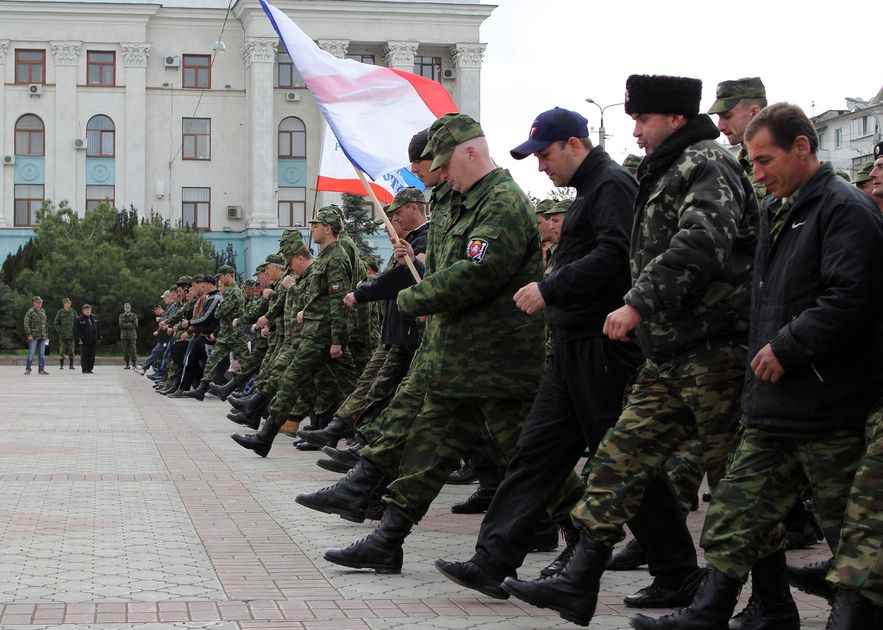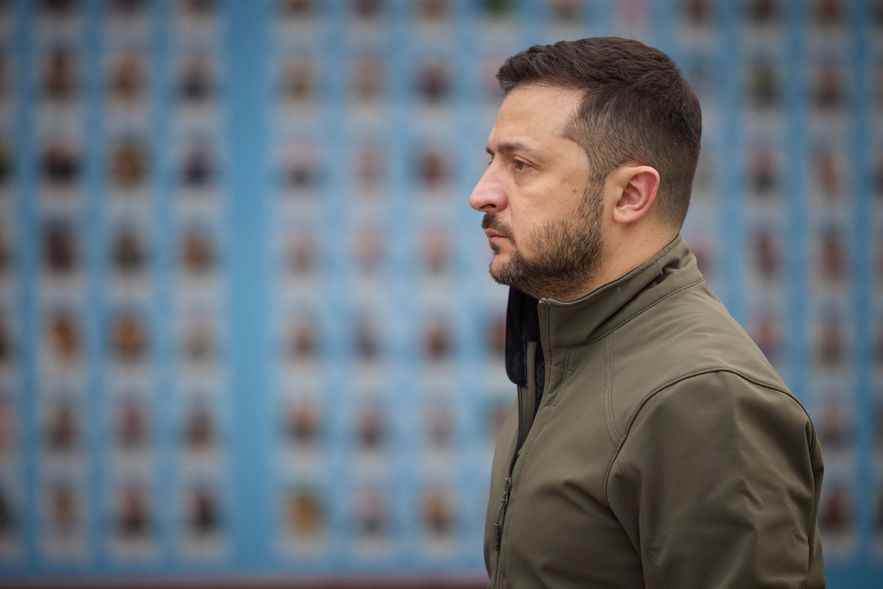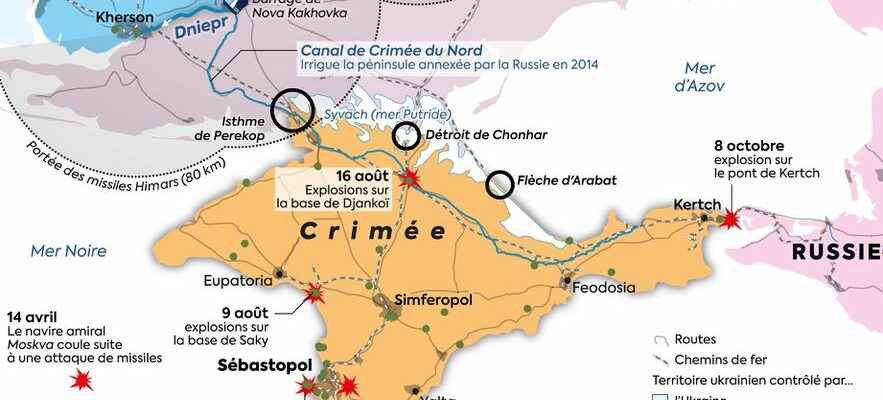As the Governor of Sevastopol, Mikhail Razvojayev reminded us, on the Telegram networkDecember 1 is one of Russia’s “days of military glory”. This close friend of Vladimir Putin was not celebrating a victory in Ukraine, but the “glorious battle” of Sinope, during which the Tsar’s navy annihilated the Ottoman fleet, in 1853. Except that Razvojayev omitted the less glorious sequel. This first major engagement of the Crimean War convinced France and Great Britain to invade the peninsula. Two years later, the tsarist empire, defeated, had to give up its expansionist policy in the Black Sea.
169 years later, will Crimea be the scene of another Russian defeat? Volodymyr Zelensky swore it. Ukraine will regain control of “all its lands”, including the peninsula, illegally annexed in 2014, insists its president. During the invasion last February, this scenario seemed unimaginable. But since then, the better organized Ukrainian forces have succeeded in driving the Russians out of the north of the country, from the Kharkiv region and then from the city of Kherson.
The reconquest of this peninsula three times the size of Corsica is no longer impossible. “By the summer of next year, Ukraine will liberate all of its territory, including Crimea,” said retired General Ben Hodges, former commander of the US Army’s land component in Europe. . Ukraine’s Deputy Defense Minister, former Major General Volodymyr Havrylov, said, November 19that Ukrainian troops could even “regain a foothold in Crimea before the end of December”.
Trenches and dragon’s teeth
If this prediction seems extremely optimistic, it nevertheless underlines that the Russian withdrawal from the western bank of the Dnieper, in mid-November, changed the situation. Some of the logistics lines linked to the Crimean peninsula are now in the crosshairs of the American HIMARS rocket launchers, a nightmare for the Russian forces with their range of 80 km and their precision to the nearest meter. To dissuade a Ukrainian crossing of the river, to stop any attempt at breakthrough, these multiply now trencheslines of “dragons’ teeth” (anti-armoured concrete blocks) and fortifications.
Map of the conflict situation in occupied Crimea.
© / Dario Ingiusto / L’Express
In particular, they strengthen the two crossing points between Crimea and the mainland: the Isthmus of Perekop, the westernmost, and the approaches to the two bridges of the Chonhar Strait – the opening of a third remote route des Himars is also envisaged on the 110 kilometer long sandy barrier beach, the Flèche Arabat. “The Russians are clearly concerned about a possible ground attack by the Ukrainians against Crimea at some point, strategist and former Australian general Mick Ryan told L’Express. The Ukrainians have repeatedly targeted him from the air and the sea.”
Not a month has passed since the summer without Crimea being attacked. On August 9, about ten combat aircraft were destroyed at the Saky airbase near the resort town of Novofedorivka. The explosions and their clouds of black smoke caused panic among tourists and traffic jams on the Kerch Strait bridge to Russia. A week later, the Ukrainians succeeded in blowing up an ammunition depot near the town of Jankoy, where several civilian infrastructures were also reportedly damaged.
Harassment of Russian military sites in Crimea has continued thanks to drones. Seven remotely piloted ships targeted the Sevastopol sea base on October 29, damaging at least one minesweeper and the frigate Admiral Makarov. Less than a month later, the peninsula was again targeted by aerial drones – with little damage – Governor Razvojayev claimed.
The most serious blow dealt to Moscow remains the impressive explosion, on October 8, which caused the collapse of a plateau of one of the two road lanes of the Kerch viaduct – the work of a truck bombed by the services Ukrainian secrets, according to Moscow. Built just after the 2014 annexation to anchor the peninsula to Russia, this political symbol is a crucial artery for transporting military equipment. Its partial destruction is a snub for Vladimir Putin, who came to inspect the progress of repairs on December 5, which should continue until next year.
“After 2014 it became ‘Putinland’ with Russian flags everywhere”
Unlike Volodymyr Zelensky, the master of the Kremlin had never approached the front. His trip to Crimea, to the site of an attack, recalls the importance of this territory which he described as “an inseparable part of Russia”. Conquered by Catherine II in the second half of the 18th century, Crimea left the bosom of the Russian Soviet Republic in 1954 to be administratively attached to that of Ukraine, on the decision of Stalin’s successor, Nikita Khrushchev.
Illegal annexation
“It has a separate history – the regions of Donetsk and Luhansk belonged to Ukraine before 1954 – and in the minds of Russian leaders, its recovery by kyiv is a historical error, underlines Lukas Aubin, researcher at the Institute of International and Strategic Relations and author of Geopolitics of Russia (Discovery). However, its annexation by force in 2014 is illegal under international law and Volodymyr Zelensky can legitimately demand that Ukraine regain control of it.”
But it promises to be difficult. A reconquest by force requires prior successes, starting with the retreat of the Russians in the Melitopol area, then in the eastern part of the Kherson region – Ukraine does not seem to have the means necessary to create a head of bridge in Crimea by air or sea, or even to cross the Dnieper.

Russian soldiers and pro-Russian volunteers rehearse before a parade on April 12, 2014 in Simferopol, Crimea.
© / afp.com/Yuri Lashov
The counter-offensive promises to be all the more costly in terms of soldiers and equipment as Russia can rely on reinforcements from the mobilization of 300,000 soldiers to defend a front line that is less extensive than in the summer. Added to this is the fact that it will want to keep the Crimea and its precious port of Sevastopol, at all costs, the seat of its Black Sea fleet since the end of the 18th century. Skeptical of Ukraine’s chances of advancing quickly, US Army Chief of Staff General Mark Milley said in mid-November that a victory in Crimea “is not going to happen anytime soon. “.
In the event of a reconquest, it is not certain, either, that the Ukrainian troops will be well received in Crimea. “After 2014, it became ‘Putinland’ with Russian flags everywhere, patriotic songs in the street, recalls Lukas Aubin. It was emptied of its pro-Ukrainian population, while many Russians came to settle there, motivated by Kremlin aids and inducements. Volodymyr Zelensky risks exposing himself to great difficulties.”
“Despite the absence of clear studies, several factors suggest that pro-Russians are very numerous: the sense of historical belonging, emotional attachment, cultural and family ties with Russia, adds Tatiana Kastouéva-Jean, director of the center Russia at the French Institute of International Relations. We must also remember the referendum on the independence of Ukraine in 1991: the majority was very short in Crimea (54%).
“With a Russian and militarized Crimea, they will always feel threatened”
Do Ukrainian strategists really have the will to recover Crimea? A foreign diplomat stationed in Paris recently explained to L’Express that kyiv should consider it as “a bargaining chip for peace” in talks. Last March, Volodymyr Zelensky’s negotiators seemed ready to make concessions, putting on the table, in front of their Russian counterparts, a 15-year freeze on Crimea’s status to reach a bilateral settlement.

Ukrainian President Volodymyr Zelensky in kyiv on October 14, 2022.
© / afp.com/Handout
But this proposal dated from a phase of the war when Ukraine was in great difficulty. From now on, its president categorically refuses the principle of a separate settlement for Crimea. “Even if he plans to play this card, he will not say so, it is not in his interest, explains Marie Dumoulin, researcher at the European Council on International Relations. Ukrainian leaders may really have the project of a reconquest as far as the Crimea.”
In this regard, Lawrence Freedman, Emeritus Professor of War Studies at King’s College London, considers in a recent note that “getting Putin to negotiate seriously may require threatening Crimea”. The author of Commander, The Politics of Korea’s Military Operations in Ukraine (not translated), further notes that “many Westerners have warned Ukraine to make Crimea a military priority, precisely because it is so important to Putin, and it is the one of the rare cases that can lead to a nuclear escalation.”
This concern was notably expressed by the academic Charles Kupchan in a recent interview with L’Express. “If Putin sees the loss of Crimea looming, I think he will consider reckless actions, including the potential use of a nuclear weapon,” said Barack Obama’s former adviser for European affairs. In my opinion, this war will not end with the full liberation of Ukrainian territory.”
However, this is the only solution currently envisaged by the Ukrainians. “With a Russian and militarized Crimea, they will always feel threatened”, points out Tatiana Kastouéva-Jean. For 87% of them, “no territorial concession is acceptable”, argued in September, a survey of the International Institute of Sociology in kyiv, against 82% in May. The war does not weaken the determination of the Ukrainians to see their flag flying again in Crimea. She strengthens it.
